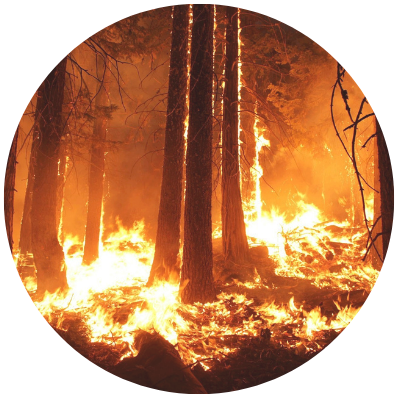Post by Craig Hebrink | Climate Initiative Leader
In 2020, we have faced a multitude of challenges, many of them catastrophic.
Wildfires are raging on the West Coast of the U.S. right now, but they are also burning out of control in Colorado, Utah, and Montana. Outside of the United States, wildfires are also destroying forests in South America and Africa and devastating parts of Greece. We must also not forget the devastation caused by fires in Australia at the beginning of the year that killed almost half a billion animals, many of them found only in Australia. In addition to the rampant wildfires, we have also faced devastating flooding and loss of life from severe hurricanes in the southern US and Asia. 25% of the country of Bangladesh was underwater on July 30. Mumbai is seeing unprecedented flooding.

On top of all of the fires and flooding, we are also experiencing a global pandemic and social unrest.
All of these things are related to climate change. 2020 will be the hottest year recorded on earth. The heat directly impacts droughts and fires. Warmer oceans drive more intense and slower moving hurricanes. The impacts of severe weather events are felt hardest by people of color and people who are impoverished. Severe weather makes it difficult, or impossible, to maintain social distancing and PPE required to control the pandemic. In other words, climate change is causing, or making, worse everything we’re experiencing in 2020.
We must take action now to prevent even more catastrophic impacts from climate change in the future.
We have no emissions budget left to continue to burn fossil fuels. If we stop emissions now, things will still get worse before they get better, but if we continue on our current pace, our children and grandchildren will remember 2020 as one of the better years they can remember, instead of one of the worst.
There is, however, cause for hope.
As we rebound/rebuild from the impacts in 2020, we can choose to rebuild in a just, equitable, and green manner. In a way that will create good jobs and a sustainable future. A future where remaining fossil fuels stay in the ground.
While individual actions won’t solve our systemic issues, they can show that we care for each other. And caring for each other is the first step toward solving systemic issues.
Use your choices, use your voices, and use your votes to push towards a sustainable future.
One way to make a small, meaningful contribution to the planet is to join Sustainable Broomfield for #SmallActionSaturday, where we will come together as a community to help make Broomfield a greener place!
Join us at Broomfield Crescent Grange, 7901 W 120th Ave, Broomfield, CO 80020, on 9/26 10:00 am – 12 pm for a community cleanup! Free compost class to follow.



